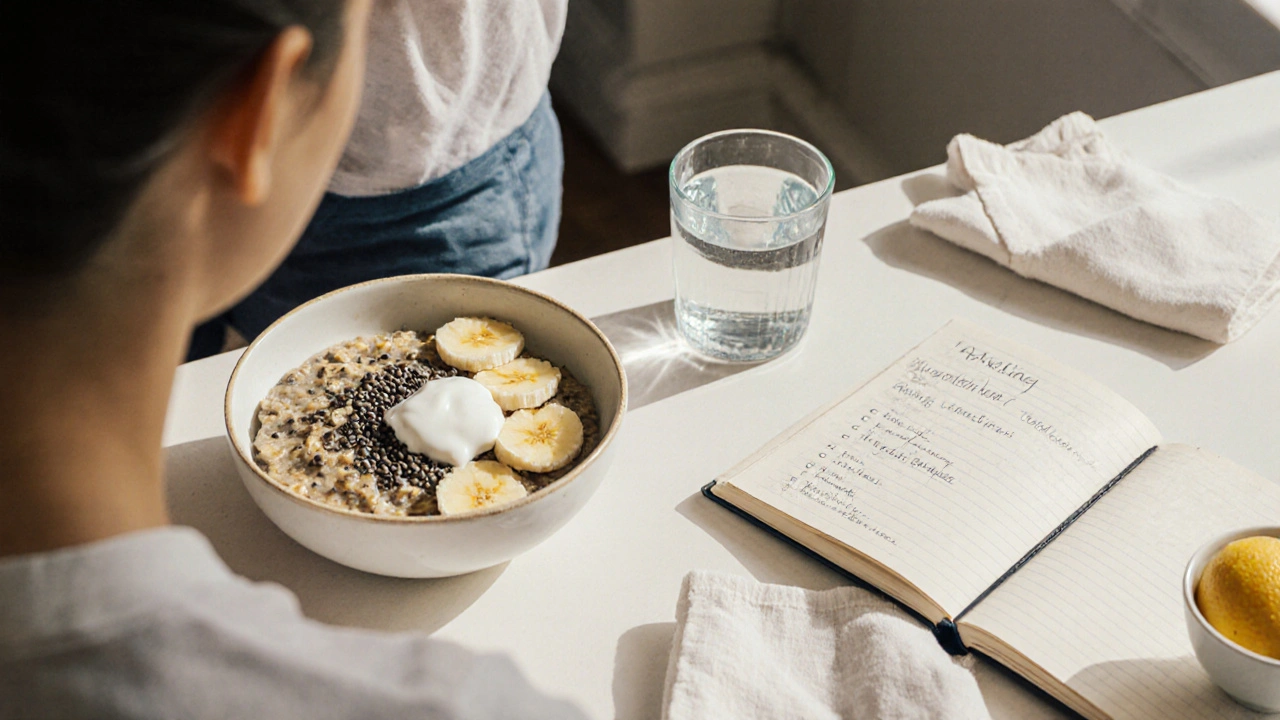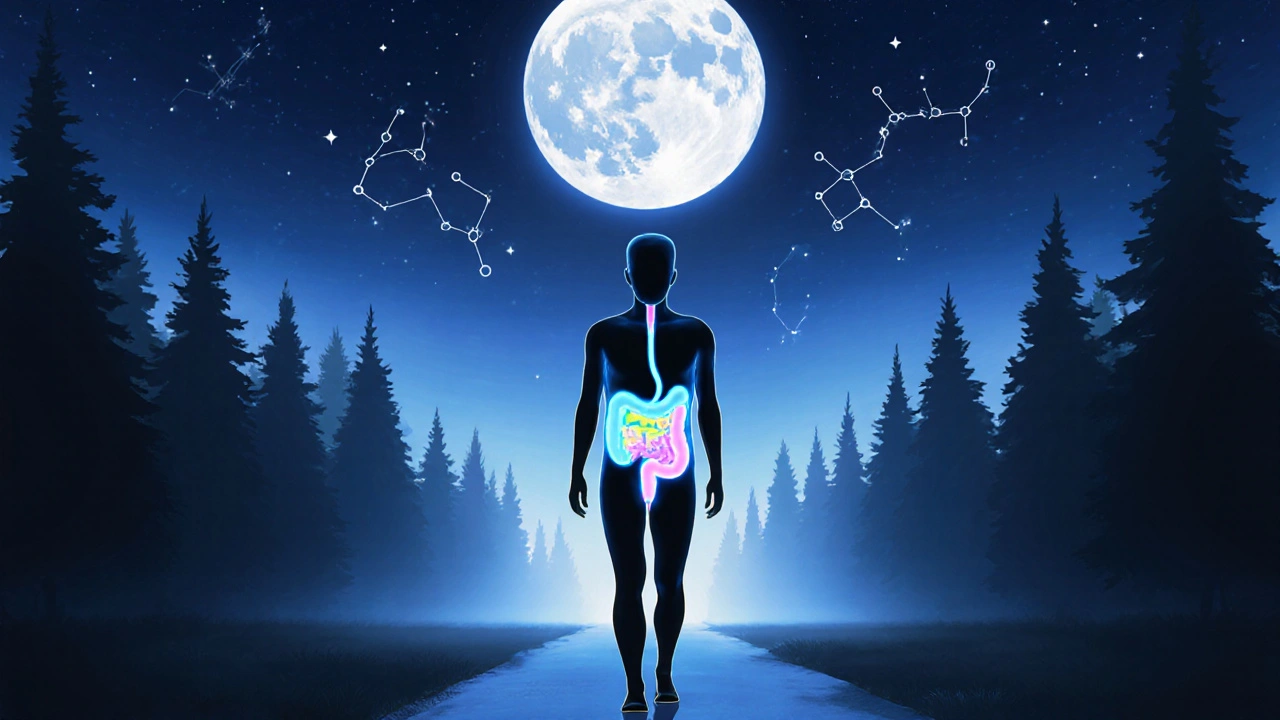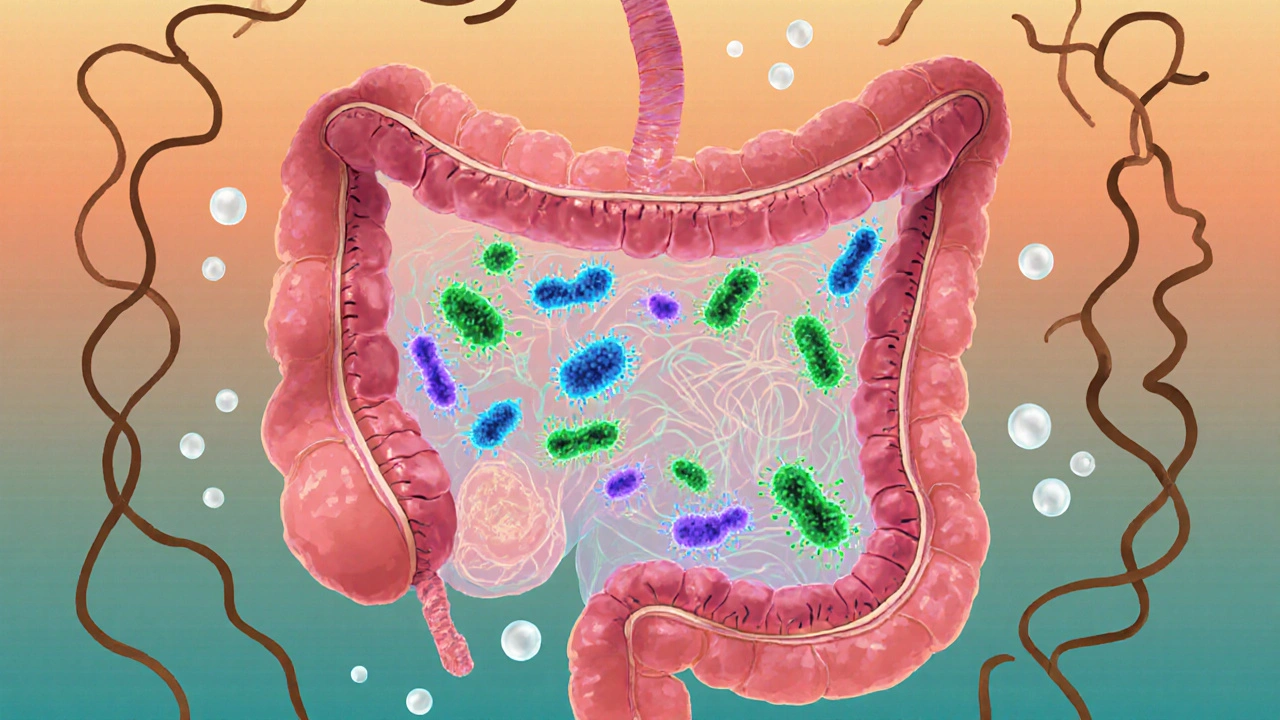Gut Health Fiber Tracker
Track Your Daily Fiber Intake
Aim for 25-30g of fiber daily for optimal gut health. Enter servings of common high-fiber foods below.
Your Results
0g
of 25-30g daily target
Aim for diverse sources like berries, chia seeds, and legumes for best results.
Quick Takeaways
- Eat at least 25‑30 g of diverse fiber daily to keep things moving.
- Include a probiotic source (yogurt, kefir, kimchi) a few times a week.
- Stay hydrated - aim for 2‑2.5 L of water per day.
- Manage stress with short breathing breaks or a walk.
- Prioritize sleep; 7‑9 hours supports a balanced gut microbiome.
Understanding Gut Health is a state of balance in the digestive system where the gut lining, motility, and resident microbes work together smoothly
When we talk about "good gastro health," we’re really talking about the invisible ecosystem living inside you. That ecosystem-often called the gut microbiome-helps digest food, produces vitamins, and even talks to your brain. If it’s out of sync, you might feel bloated, low‑energy, or get cravings you can’t explain.
Why Gut Health Matters More Than Ever
A 2023 meta‑analysis of 78 studies showed that people with a diverse gut microbiome have a 20 % lower risk of developing chronic inflammation‑related conditions such as type 2 diabetes and heart disease. In everyday life, that translates to fewer sick days, steadier mood, and better nutrient absorption.
Modern diets high in processed sugar, low in fiber, and coupled with stressful schedules can starve your gut microbes. Re‑building that community is easier than you think-just a handful of daily habits.
The Five Pillars of a Happy Gut
- Fiber - the roughage that fuels beneficial bacteria.
- Probiotics - live cultures that add good microbes directly.
- Prebiotics - plant compounds that feed the existing good bacteria.
- Hydration - water keeps the gut lining supple and helps move waste.
- Stress Management - cortisol spikes can disrupt gut motility and microbial balance.
Each pillar supports the others, so you don’t have to pick just one. Think of them as a team sport; the whole wins when every player shows up.
Fiber: The Engine Room
Fiber comes in two flavors: soluble (found in oats, apples, and legumes) and insoluble (found in whole‑grain breads, nuts, and seeds). Soluble fiber forms a gel‑like substance that slows sugar absorption, while insoluble fiber adds bulk and speeds transit.
Aim for at least 25 g of fiber for women and 30 g for men each day. A quick way to hit that target is to add a handful of berries, a spoonful of chia seeds, and a side of roasted chickpeas to any meal.

Probiotics: Adding Friendly Soldiers
When you consume Probiotics are live microorganisms, usually bacteria, that confer a health benefit when taken in adequate amounts, you’re boosting the numbers of helpful strains like Lactobacillus and Bifidobacterium. Fermented dairy (yogurt, kefir), kimchi, sauerkraut, and kombucha are all natural sources.
Pick a product with at least 1 billion CFU (colony‑forming units) per serving and a label that lists the strains. For most people, a serving three times a week is enough to make a noticeable difference.
Prebiotics: Feeding the Good Guys
Prebiotics are indigestible fibers that act as food for your resident microbes. Common prebiotic foods include garlic, onions, leeks, asparagus, and Jerusalem artichoke. Even a small spoonful of raw garlic in a salad can make a big impact over time.
Combine prebiotic and probiotic foods in the same meal for a "synbiotic" effect. Example: a bowl of kefir topped with sliced banana and a drizzle of honey - the banana provides prebiotic fructooligosaccharides, while the kefir supplies live cultures.
Hydration and the Gut Lining
The gut wall is made of a single layer of cells lined with mucus. Water helps keep that mucus slippery, preventing irritation and supporting nutrient transport. Dehydration can lead to constipation, increased gut permeability, and a higher chance of inflammation.
Drink water throughout the day - a good rule of thumb is to sip a glass every hour you’re awake. If plain water feels boring, add a splash of lemon or cucumber for flavor without sugar.
Stress Management refers to techniques that lower the body's stress response and protect gut function
Stress releases cortisol, which can slow digestion and alter the composition of the microbiome. Simple habits like a 5‑minute breathing exercise, a short walk, or a quick stretch can reset your nervous system.
Try the "4‑7‑8" breath: inhale for 4 seconds, hold for 7, exhale for 8. Doing this three times after meals can calm the gut and reduce bloating.

Fermented Foods: Natural Power‑Boosters
Fermentation transforms ordinary vegetables and dairy into probiotic‑rich foods. Below is a quick guide:
- Kimchi is a spicy Korean cabbage dish jam-packed with Lactobacillus
- Sauerkraut offers similar benefits with a milder flavor profile
- Miso is a salty Japanese paste that can be used in soups or dressings
- Kombucha is a fermented tea that provides both probiotics and antioxidants
Start with a small portion (¼ cup) a few times a week and listen to how your belly reacts. Some people feel a bit of gas at first - that’s normal as the microbes settle in.
Simple Daily Habits to Reboot Your Gut
- Breakfast: Overnight oats with chia seeds, sliced banana, and a dollop of kefir.
- Mid‑morning: A glass of water with a squeeze of lemon.
- Lunch: Mixed greens, roasted chickpeas, shredded carrots, and a side of kimchi.
- Afternoon: 5‑minute breathing break.
- Dinner: Grilled salmon, quinoa, steamed broccoli, and a small serving of sauerkraut.
- Evening: Herbal tea (peppermint or ginger) and a short walk.
Following this template for a week gives your gut diverse fuel, regular hydration, and a calm nervous system - all the key ingredients for long‑term gut resilience.
Common Pitfalls and How to Fix Them
- Too much fiber too fast - can cause gas and bloating. Introduce fiber gradually and pair with plenty of water.
- Relying only on supplements - capsules lack the food matrix that helps microbes thrive. Use whole‑food sources whenever possible.
- Ignoring sleep - poor sleep disrupts the circadian rhythm of gut bacteria. Aim for a consistent bedtime.
- Excessive alcohol - can damage the gut lining and kill beneficial microbes. Keep intake moderate (≤1 drink per day for women, ≤2 for men).
When to Call a Professional
If you experience persistent symptoms such as:
- Unexplained weight loss or gain
- Frequent diarrhea or constipation lasting more than two weeks
- Severe abdominal pain
- Blood in stool
These could signal an underlying condition like IBS, celiac disease, or a bacterial overgrowth. A registered dietitian or gastroenterologist can run tests (stool analysis, breath test) and tailor a plan for you.
Frequently Asked Questions
How long does it take to feel better after changing my diet?
Most people notice reduced bloating and steadier energy within 1‑2 weeks, but a fully balanced microbiome can take 4‑6 weeks of consistent habits.
Are probiotic supplements necessary if I eat fermented foods?
Not usually. Whole‑food sources provide diverse strains and the food matrix that helps them survive stomach acid. Supplements are handy for targeted therapy under a professional’s guidance.
Can stress really affect my digestion?
Yes. Stress triggers the "fight‑or‑flight" response, slowing gut motility and altering microbial composition, which can lead to cramps, gas, or changes in bowel habits.
What’s the best way to increase fiber without feeling full all the time?
Spread fiber throughout the day: add berries to breakfast, a handful of nuts to a snack, and a side of legumes to dinner. This avoids a single massive bulk and keeps energy steady.
Is there a link between gut health and mental health?
Absolutely. The gut produces about 90 % of serotonin, the mood‑regulating neurotransmitter. An imbalanced microbiome is associated with anxiety and depression in multiple studies.






